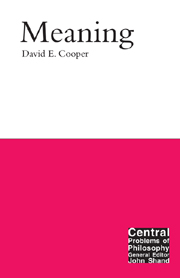1 - Preliminaries
Summary
This book is both more and less modest in ambition than most English-language philosophical writings on meaning in recent times. In part, this is because the book belongs in a series primarily aimed at students who are no longer beginners in philosophy, so that it has its sights set higher than those of an introductory textbook, but without aspiring to the level of detailed and perhaps technical argumentation expected in a specialist monograph. The main reason for the book's blend of modesty and ambition, however, is different, and owes to the fact that the writings I have in mind have primarily pursued theoretical projects in the philosophy of language. Let me explain, beginning with the respect in which the book is less modest in ambition than those writings.
Linguistic and non-linguistic
Here are the opening lines of a recent book bearing, like mine, the terse title Meaning: “What is meaning? Why are some sounds imbued with it and others not? How, for example, does it come about that the word ‘dog’ means precisely what it does?” (Horwich 1999: 1). The author takes it for granted that questions about meaning belong to the philosophy of language, and nowhere indicates that anything except words and other linguistic items may have meaning. The Oxford Companion to Philosophy entry on meaning follows suit. Questions about meaning, which “present some of the most intractable problems of philosophy”, are immediately equated with ones about “linguistic meaning and the way language relates to reality” (Crane 1995: 541).
- Type
- Chapter
- Information
- Meaning , pp. 1 - 15Publisher: Acumen PublishingPrint publication year: 2003

